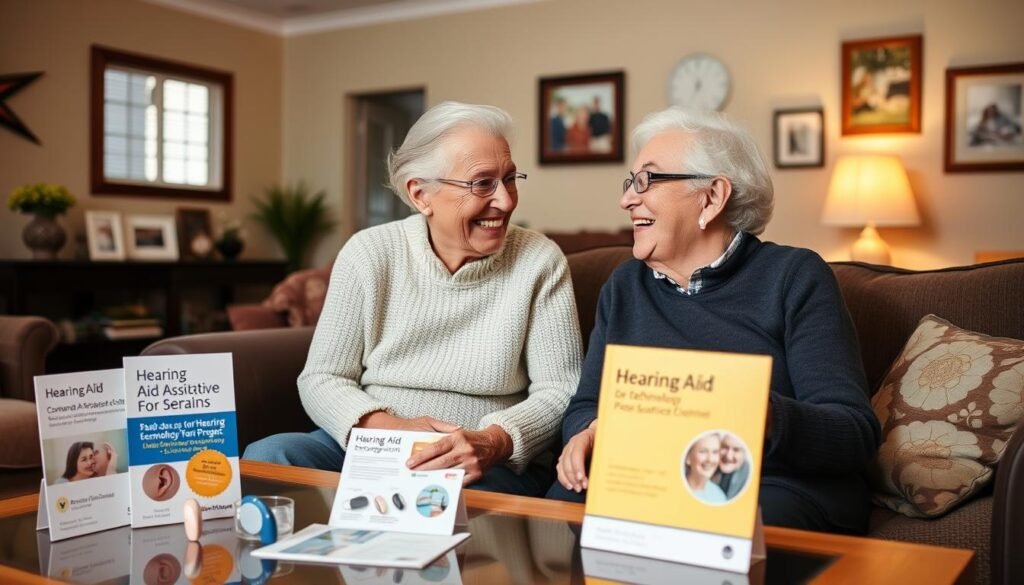More than 48 million Americans, including two in three adults over 70, live with hearing loss1. This is a big problem, as untreated hearing loss can increase healthcare costs by 46.5%1. Yet, only about 15% of those who need hearing aids actually get them1.
The average person waits nearly nine years to get hearing aids after finding out they have hearing loss1. This guide aims to help seniors understand insurance and financial help for hearing aids. It covers the different resources available, which vary a lot from state to state and county to county.
Key Takeaways
- Over 48 million Americans, including two-thirds of adults over 70, experience hearing loss.
- Fewer than 15% of adults who need hearing aids actually use them, with an average delay of nine years between diagnosis and adoption.
- Insurance coverage for hearing aids varies widely, with only five states mandating coverage and Medicare Parts A and B not providing coverage.
- Medicare Advantage plans, Medicaid, and some private insurers may offer limited hearing aid benefits, but coverage varies greatly.
- Navigating the healthcare system and insurance policies to obtain affordable hearing aids can be challenging for seniors.
Understanding Hearing Aid Coverage
Hearing loss is common among seniors, with 75% of those aged 70 and older affected in the United States2. It’s important for their quality of life and to prevent feeling isolated. But, figuring out insurance for hearing aids can be hard for many retirees.
Importance of Insurance Coverage for Hearing Aids
Hearing aids cost between $299 to $2,500 per pair, which is a big expense for seniors2. Insurance can help make hearing aids more affordable. Sadly, only five states require health insurance to cover hearing aids for adults: Arkansas, Connecticut, Illinois, New Hampshire, and Rhode Island2.
How Hearing Loss Affects Seniors
Hearing loss can greatly affect a senior’s life, leading to isolation, cognitive decline, and higher healthcare costs2. Almost 38 million American adults need help with their hearing, showing how common this issue is2. It’s key for seniors to know about insurance options for hearing aids to stay independent and healthy.
“Hearing loss can be a significant barrier to social engagement and overall health for many seniors. Having access to affordable hearing aids through insurance coverage can make a real difference in their quality of life.”
Types of Insurance That May Cover Hearing Aids
Seniors have many insurance choices for hearing aids. Medicare Parts A and B don’t cover hearing aids or exams. But, Medicare Advantage (Part C) plans might offer hearing benefits, depending on the plan. Recent data shows Medicare Advantage plans work with companies like Humana, Aetna, and UnitedHealthcare for hearing aid coverage3.
Medicare Coverage for Hearing Aids
For those on traditional Medicare, the news is not good. Original Medicare (Parts A and B) doesn’t cover hearing aids or fitting exams4. But, Medicare Part B does cover hearing and balance exams if a doctor orders them3.
Medicaid Options for Seniors
Medicaid’s coverage for hearing aids changes by state. It’s based on income3. Medicaid must cover hearing aids for kids, but for adults 21 and older, it’s not required. Yet, many states offer some hearing aid benefits for adults4.
Private Insurance Plans
Private insurance for hearing aids varies a lot. Only five states – Arkansas, Connecticut, Illinois, New Hampshire, and Rhode Island – require coverage for adults3. In other states, insurers can choose to offer hearing aid benefits. The coverage can differ a lot between plans4. Seniors should check their policies and talk to their insurers to know what’s covered4.
| Insurance Type | Hearing Aid Coverage |
|---|---|
| Medicare Parts A and B | No coverage for hearing aids or related exams |
| Medicare Advantage (Part C) | May offer hearing benefits, depending on the plan |
| Medicaid | Coverage varies by state; often based on income requirements |
| Private Insurance | Coverage is not mandated in most states, with only five states requiring it |
In summary, seniors have many insurance options for hearing aids. This includes Medicare Advantage plans and state-specific Medicaid programs. Knowing the details of each option helps seniors make the best choices for their hearing health345.
Medicare and Hearing Aids: What You Need to Know
As a senior, knowing about Medicare coverage for hearing aids is key. Original Medicare (Parts A and B) doesn’t cover hearing aids or fitting exams6. But, there are ways to manage the costs of better hearing.
Original Medicare vs. Medicare Advantage
With Original Medicare, hearing-related services have limited coverage. Medicare Part B covers 80% of the cost for hearing and balance exams after you meet the deductible6. But, Medicare Advantage (Part C) plans might offer more, like lower prices for hearing aids through certain providers6. It’s vital to check your plan’s details for what’s covered and what you might pay out of pocket.
Coverage Limits and Requirements
Original Medicare doesn’t cover hearing aids7. But, it does cover some hearing implants like Auditory Osseo integrated and BAHA as prosthetic devices7. Hearing aid costs can range from $900 to $6,000 or more, based on the technology7. If you have a Medicare Advantage plan, know the specific rules for hearing aids and services to choose wisely.
“Approximately 1 in 3 Americans between the ages of 65–74 have hearing loss, with nearly half of Americans over 75 experiencing difficulty hearing.”7
Understanding your Medicare options can help you choose the best for your hearing and budget. Look into Original Medicare, Medicare Advantage, and Medicaid to find the right fit for your hearing needs.
Medicaid and Hearing Aids: Key Insights
Understanding Medicaid’s role in helping seniors with hearing loss is key. Medicaid, a joint state and federal health insurance, offers affordable hearing care options for older adults8.
State-Specific Medicaid Programs
Medicaid’s coverage for hearing aids differs by state. Some states cover everything from evaluations to repairs, while others offer less8. Knowing what your state’s Medicaid program covers is vital.
Eligibility Criteria for Seniors
To get Medicaid for hearing aids, seniors must meet income and asset limits set by their state9. They need to show proof of age, income, assets, and residency9. Talking to an audiologist can help you understand these requirements and apply successfully.
While Medicaid can help with hearing aids, there are limits9. These might include cost caps, device type restrictions, and excluded features9. Knowing your state’s Medicaid program well can help you get the most out of it.

“Medicaid coverage for hearing aids can be a game-changer for seniors struggling with the high cost of hearing care. By understanding the nuances of your state’s program, you can ensure you’re taking full advantage of the available benefits.”
Private Insurance Plans and Hearing Aids
Private insurance for hearing aids varies a lot. About 25% of Americans have some savings for hearing aids through their insurance10. On average, people with insurance get $1,257 for each hearing aid10.
Coverage Variability Among Insurers
Big names like BlueCross BlueShield, UnitedHealth Group, and Anthem BCBS have different coverage levels11. Some plans cover a lot, while others cover little or nothing. It’s important to check your policy well to know what you get.
Understanding Your Policy’s Fine Print
When looking at private insurance, read the fine print carefully. Coverage can change a lot, even with the same provider11. Some plans might cover everything, while others might only pay part of it or have strict rules11. Knowing your policy well helps you use your insurance better for hearing aids.
“Hearing loss affects one-third of adults over the age of 6512. The average cost of a single hearing aid is $2,400, and most people need two, costing almost $5,00012. Knowing your insurance can really help with these costs.”
Even though some states require insurance to cover hearing aids, the details can differ11. It’s key to check your state’s rules and look into other ways to pay for hearing aids, like CareCredit or non-profit groups10.
Extra Benefits and Programs for Seniors
Seniors can find more than just insurance to help with hearing aids. Some makers offer discounts for older adults13. Groups like the Hearing Loss Association of America (HLAA) also help find financial aid13.
Discounts from Hearing Aid Manufacturers
Big names in hearing aids know seniors face money troubles. They have special deals to help. These deals can make hearing aids cheaper for those with limited budgets13.
Nonprofit Organizations Providing Assistance
Groups like the HLAA support those with hearing loss. They help find grants, loans, and local programs for hearing aids13.
Veterans might get help from the U.S. Department of Veterans Affairs (VA)13. Federal workers and retirees can get discounts through the Federal Employee Program (FEP)13. Seniors should also look into state services for more help13.
Using these benefits, seniors can get the hearing aids they need. This improves their life and keeps them independent1314.

How to File a Claim for Hearing Aids
Filing a claim for hearing aids can be tricky. But knowing what documents you need and why claims get denied can make it easier15. Usually, if your doctor’s office is in the network, they’ll handle the claim for you15. Hearing loss is a big problem worldwide, affecting millions15.
Necessary Documentation for Claims
To file a claim, you’ll need audiological evaluations, prescriptions, and receipts15. It’s also smart to have a hearing aid clinic check your insurance. They know the insurance world well15.
Common Reasons for Claim Denials
Claims can get denied for many reasons. These include missing info, not meeting medical needs, or services not being covered15. Knowing your policy well and working with your audiologist can help you avoid these issues15.
| Reason for Claim Denial | Explanation |
|---|---|
| Lack of Medical Necessity | The insurance says the hearing aids aren’t needed based on your papers. |
| Exceeding Coverage Limits | The cost of the hearing aids is more than your insurance allows. |
| Use of Out-of-Network Provider | The provider isn’t in your insurance network, so you get less or no coverage. |
Knowing your policy and working with your audiologist can make the claims process smoother for hearing aids.15
Hearing device insurance eligibility for seniors and hearing aid coverage for pensioners can change a lot. Each insurance plan is different15. You might need to submit a claim yourself, depending on your plan15.
“A resource from ASHA is available for individuals dealing with claim denial.”15
In short, to file a successful claim for hearing aids, you need the right documents and to understand your insurance15. Working well with your audiologist can help you get the most from your hearing aid coverage for pensioners and hearing device insurance eligibility for seniors1516.
Preparing for Your Hearing Aid Consultation
Exploring hearing aids can seem overwhelming. But, with the right prep, your consultation with a hearing specialist will be smoother. It’s key to know your insurance and the types of hearing aids out there. This way, you can find the perfect fit for your lifestyle and budget.
Questions to Ask Your Hearing Specialist
At your appointment, ask your specialist important questions. Find out about the technology and features of the hearing aids. Also, ask how they’ll work with your daily life17. Knowing the difference between prescription and over-the-counter aids is also vital. It affects your costs and upkeep over time.
Understanding the Types of Hearing Aids Available
Hearing aids vary in style and technology, each with its own pros and cons. Your specialist can walk you through these options. They’ll talk about amplification, noise reduction, and wireless features17. They’ll also help with the financial side, like insurance coverage and discounts.
By getting ready for your consultation and asking the right questions, you’re on the right path. You’ll find a hearing solution that’s both affordable and meets your needs as a retiree17. Your specialist will guide you through insurance and ensure your investment in hearing aids is worth it.

Tips for Maximizing Your Insurance Benefits
To get the most from your hearing aid insurance, stay updated on policy changes. Also, regularly check your coverage options18. Big names like Blue Cross Blue Shield and Cigna work with TruHearing and Nations Hearing. This helps seniors get the most from their insurance18.
It’s key to know how your insurance covers hearing aids. Some plans cover everything, while others only cover part or nothing at all19. Also, watch out for any costs like deductibles, co-pays, or maximums for hearing care19.
If you have a Medicare Advantage plan, remember that hearing aid benefits can change each year. It’s smart to check your coverage during open enrollment18. Medicare Supplement (Medigap) plans also have different hearing aid coverage, depending on the insurer and plan20.
Keep records of your hearing-related medical costs, including any you paid out of pocket. These costs might be tax-deductible if they’re a big part of your income18.
By staying informed, checking your coverage often, and tracking your costs, you can make the most of your insurance. This way, you’ll get the hearing care you need1820.
Cost Considerations for Hearing Aids
For older adults, the cost of hearing aids can be a big challenge. Even with insurance, the costs can be high. In the U.S., hearing aids cost about $2,500 each, ranging from under $1,000 to over $6,00021. Costs also include batteries, maintenance, and accessories.
Prices vary based on features, custom fits, and type. For example, BTE hearing aids cost around $1,199 for a pair21. ITC devices can cost up to $2,950 for a set2122. The FDA’s new rules on OTC hearing aids could save Americans up to $3,000 on a pair21.
Possible Financial Aid Resources
There are many ways to help pay for hearing aids for older adults. State programs, vocational services, and nonprofits offer financial help22. Some makers also have financing plans21.
It’s key to look into all these options. This way, older adults can find affordable hearing aids23.

| Hearing Aid Type | Average Cost (per pair) |
|---|---|
| Behind-the-Ear (BTE) | $1,198.98 |
| In-the-Canal (ITC) | $2,950.00 |
“Three-quarters of Americans with functional hearing loss are unable to afford the costs of hearing care.”21
Navigating Appeals for Denied Claims
If your claim for hearing aid coverage was denied, don’t give up. As a senior, you can appeal the decision. You’ll need to provide more information to show why the hearing devices are medically necessary24.
Steps to Appeal a Hearing Aid Coverage Denial
- First, understand why your claim was denied. Your insurer should explain the reason clearly.
- Next, collect evidence from your doctor or audiologist. This could include medical records and a letter explaining why you need the hearing aids.
- Then, follow your insurer’s appeal process. This might mean submitting your appeal within a certain time frame and providing all necessary documents.
Seeking Professional Help for Appeals
Appealing can be tough, but getting help can make a big difference. Consider a patient advocate or an experienced audiologist to help you. They can guide you and make sure your appeal is strong24.
It’s key to keep trying and keep records of all talks with your insurance. Appeals can take time, but your hard work can lead to success24.
“Don’t let a denied claim discourage you. With the right approach, you can successfully appeal and secure the hearing aid coverage you need.”
For more help on appealing a denied claim, check out Engaging with Insurers: Appealing a Denial24.
Additional Resources for Seniors
There are many resources beyond insurance for seniors with hearing aids. Online tools like Medicare’s Plan Finder help you check your coverage. They also help find the best fit for you25.
Support groups, like those from the Hearing Loss Association of America, offer great support. They share information and help seniors with hearing loss26. State agencies on aging also provide help and guidance on local programs for senior citizen hearing aid assistance and hearing aid benefits for retirees25.
For more help, contact professional organizations for audiologists and hearing aid specialists. They offer information on insurance and financial help for seniors25. With the right help, you can get the hearing aid benefits for retirees you need26.
FAQ
What insurance covers hearing aids for seniors?
How does Medicare cover hearing aids for seniors?
What does Medicaid cover for senior hearing aids?
How do private insurance plans cover hearing aids for the elderly?
What are the common reasons for denied hearing aid insurance claims?
What resources are available for seniors seeking financial assistance for hearing aids?
Source Links
- Financial Assistance for Hearing Aids: A Complete Guide for Older Adults – https://www.ncoa.org/adviser/hearing-aids/financial-assistance-hearing-aids/
- Does Medicare or Insurance Cover Hearing Aids in 2024? – https://www.ncoa.org/adviser/hearing-aids/hearing-aids-insurance-coverage/
- Here’s How to Find Out If Your Insurance Covers Hearing Aid – https://www.soundly.com/blog/hearing-aids-insurance
- 5 ways insurance covers hearing and hearing aids – https://www.healthmarkets.com/resources/health-insurance/hearing-aid-insurance/
- Paying for Hearing Aids with Health Insurance – https://www.hearingtracker.com/hearing-aid-insurance-coverage
- Does Medicare & Insurance Cover Hearing Aids in 2024? – https://www.ncoa.org/adviser/hearing-aids/does-medicare-cover-hearing-aids/
- Does Medicare cover hearing aids? – https://www.humana.com/medicare/medicare-resources/does-medicare-cover-hearing-aids
- Does Medicaid Cover Hearing Aids for Seniors? – https://www.springhills.com/resources/does-medicaid-cover-hearing-aids-for-seniors?25ef5918_page=4
- What Kind of Hearing Aids Does Medicaid Cover? – https://www.springhills.com/resources/what-kind-of-hearing-aids-does-medicaid-cover?25ef5918_page=2
- Aflac Supplemental Insurance – https://www.aflac.com/resources/health-insurance/are-hearing-aids-covered-by-insurance.aspx
- Understanding Hearing Aid Insurance – https://americanhearing.us/understanding-hearing-aid-insurance/?srsltid=AfmBOopNCZgZi5I_BFUEm08WbF6Cxz46EecXSl6D7Kgcd7Up0FCfHKIq
- Many seniors need hearing aids. Why doesn’t Medicare cover them? – https://www.statnews.com/2019/02/27/hearing-aids-medicare-coverage/
- Hearing Benefits – Information for Providers Fact Sheet_7.2.24 – https://www.dhcs.ca.gov/individuals/Documents/Hearing-Benefits-Provider-Fact-Sheet.pdf
- Will Medicare Cover Hearing Tests? – https://www.aarp.org/health/medicare-qa-tool/does-medicare-cover-hearing-tests.html
- How to Self-Submit Your Hearing Aids for Insurance Benefit – https://www.soundly.com/blog/self-submit-hearing-aids-insurance-benefit
- VA.gov | Veterans Affairs – https://www.prosthetics.va.gov/psas/hearing_aids.asp
- Understanding Hearing Aid Insurance – https://americanhearing.us/understanding-hearing-aid-insurance/?srsltid=AfmBOoqKISvYMrIUfyisRc2zHBM1y-Z6KlvHkjw4_LQD9hYRzsnDL1jH
- Hearing Aid Insurance Benefits – https://americanhearing.us/hearing-aid-insurance-benefits/?srsltid=AfmBOorFwvuht4WyZ1ecS7CGIlOnUOk62dDX0_wvUp5kuS3jrqG00btM
- Understanding Hearing Aid Insurance Coverage – https://oremut.audiologyhq.com/understanding-hearing-aid-insurance-coverage/
- Hearing aid insurance: Coverage and more – https://www.medicalnewstoday.com/articles/hearing-aid-insurance
- How Much Do Hearing Aids Cost in 2024? – https://www.medicalnewstoday.com/articles/cost-of-hearing-aids
- The Cost of Hearing Aids: What You Need to Know – https://www.healthline.com/health/cost-of-hearing-aids
- Hearing aids: How to choose the right one – https://www.mayoclinic.org/diseases-conditions/hearing-loss/in-depth/hearing-aids/art-20044116
- How To Navigate Insurance Coverage For Hearing Aids – https://beavertonor.audiologyhq.com/how-to-navigate-insurance-coverage-for-hearing-aids/
- How To Get Free Hearing Aids For Seniors – https://www.forbes.com/health/hearing-aids/free-hearing-aids/
- financial assistance for hearing devices – https://www.audicus.com/hearing-aid-assistance/?srsltid=AfmBOoqjibKhEzODV1cqOmF1diHYDYE91vg_yUJWGMSn-aDN-IvEJQXT
